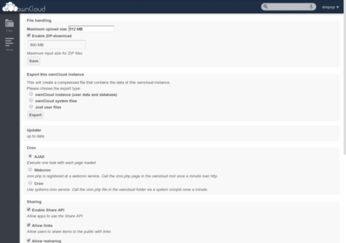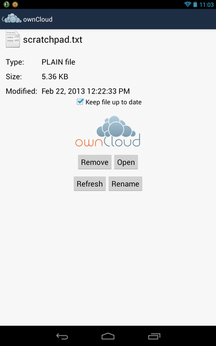Migrating to ownCloud

Productivity Sauce
I've been meaning to move from Wuala to ownCloud for some time, but there were always more important things on my to-do list. Recently, though, Wuala started to act up, so it was time to take the plunge. What can I say? I wish I moved to ownCloud earlier. Deploying the application on my virtual private server took about 15 minutes. I chose the manual installation procedure, but there is also a web-based installer which does the donkey job of installing ownCloud for you.
ownCloud requires practically no configuration. I disabled a few default apps I wasn't planning on using, and that was it. To enable the file synchronization functionality, I installed the ownCloud desktop client on my machines. The ownCloud project offers binary packages for all popular Linux distributions, including all Ubuntu flavors, so installing the client was a matter of adding a repository to the sources.list file and running the apt-get update && apt-get install owncloud-client command. Configuring the client wasn't particularly difficult either. I provided connection info, specified the directories I wanted to keep in sync, and the client took it from there. So far, it works like a charm. Since ownCloud features a built-in text editor, I can access synced files and edit them in a browser.
The ownCloud project also offers an Android app which can be used to access files and documents from an Android device. The clever part is that you can grab a file and keep it in sync by enabling the Keep file up to date option. The app also includes the instant upload functionality, which automatically uploads photos taken with the Android device to ownCloud.
comments powered by DisqusSubscribe to our Linux Newsletters
Find Linux and Open Source Jobs
Subscribe to our ADMIN Newsletters
Support Our Work
Linux Magazine content is made possible with support from readers like you. Please consider contributing when you’ve found an article to be beneficial.

News
-
The Next Linux Kernel Turns 7.0
Linus Torvalds has announced that after Linux kernel 6.19, we'll finally reach the 7.0 iteration stage.
-
Linux From Scratch Drops SysVinit Support
LFS will no longer support SysVinit.
-
LibreOffice 26.2 Now Available
With new features, improvements, and bug fixes, LibreOffice 26.2 delivers a modern, polished office suite without compromise.
-
Linux Kernel Project Releases Project Continuity Document
What happens to Linux when there's no Linus? It's a question many of us have asked over the years, and it seems it's also on the minds of the Linux kernel project.
-
Mecha Systems Introduces Linux Handheld
Mecha Systems has revealed its Mecha Comet, a new handheld computer powered by – you guessed it – Linux.
-
MX Linux 25.1 Features Dual Init System ISO
The latest release of MX Linux caters to lovers of two different init systems and even offers instructions on how to transition.
-
Photoshop on Linux?
A developer has patched Wine so that it'll run specific versions of Photoshop that depend on Adobe Creative Cloud.
-
Linux Mint 22.3 Now Available with New Tools
Linux Mint 22.3 has been released with a pair of new tools for system admins and some pretty cool new features.
-
New Linux Malware Targets Cloud-Based Linux Installations
VoidLink, a new Linux malware, should be of real concern because of its stealth and customization.
-
Say Goodbye to Middle-Mouse Paste
Both Gnome and Firefox have proposed getting rid of a long-time favorite Linux feature.


